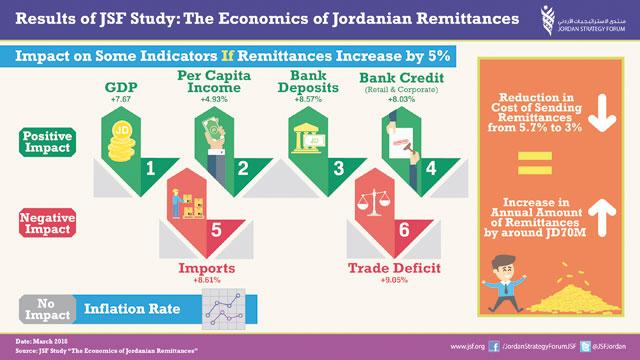You are here
Jordanians working in Saudi Arabia most likely to remit funds — study
By Ana V. Ibáñez Prieto - Jul 05,2018 - Last updated at Jul 05,2018
AMMAN — Jordanian stakeholders must give the Saudi labour market their priority, according to a study issued by the Jordan Strategy Forum (JSF) on Thursday, which found that “although the income level of Jordanians working in Saudi Arabia is generally lower, their probability to remit funds is higher”.
Titled “Jordanian Expatriates in the Gulf: Who Remits, How Much and Why?” the report builds on the results of a survey conducted on 1,167 Jordanians working in the Gulf during the period between September 2017 and March 2018, aimed at determining the factors that affect the expatriates’ decision to remit funds to Jordan, the amount of the remitted funds, and the income of Jordanians working in the Gulf.
The survey comes as a result of a previous study published by the JSF in March this year, which identified a positive impact of remittances in the real GDP growth rate, bank deposits, bank foreign exchange deposits and bank credit to the private sector.
“The education level of Jordanians working in the Gulf region is the most important factor affecting their income positively, while a higher income level increases the probability of remitting and the average amount of remitted funds,” JSF Director of Research Ghassan Omet told The Jordan Times, adding that “together, these observations indicate that all stakeholders must maintain high and competitive university education”.
Age, previous working experience in Jordan, working in Saudi Arabia, income level and working for the public sector were identified as the factors increasing the probability of remitting funds to the Kingdom, while the number of working years in Gulf countries was found to decrease the chances of sending funds back to Jordan.
Concerning the amount of remitted funds, the report found that working in Saudi Arabia, the number of working years in the Gulf, income level and working for the public sector raised the average amount of funds remitted to Jordan.
The income level of the respondents appeared to be affected by age, education level, number of working years in the Gulf and working for the private sector, while working in Saudi Arabia and for the public sector affected the income levels negatively.
Considering the findings, the study recommended that stakeholders “look at the quality of education, especially at the university level, as a top policy priority”, noting that “one can only expect that Jordanians working in the Gulf will face increasingly greater levels of competition from local citizens and Arab migrants for their labour service”.
“Relevant stakeholders such as the Ministry of Labour must maintain good analysis of the labour market in the Gulf countries,” the report continued, stressing that “with such up-to-date information, individuals can better plan their future, stay longer in the Gulf, and hence, maximise the amounts of remittances”.
In addition, the study noted that “assuming that individuals working in the public sector are more likely to remit, the government must always work on maintaining, if not increase, their numbers”, explaining that “this can be done by looking for government-to-government agreements in hosting this part of the Jordanian labour supply”.
However, JSF warned that stakeholders must examine the reasons why a large proportion of the remitted funds are not invested in the local economy, pointing out that 27.1 per cent of the expatriates do not rely on official channels when remitting their funds, while 64.6 per cent of the respondents simply deposit their remittances in banks.
“The cost of money transfers must be the main reason, as Jordanians rely on their social network to send money back to their home country,” Omet commented, adding that “the fact that unofficial remittances are not accounted prevents the Central Bank of Jordan from measuring the money supply accurately”.
Related Articles
AMMAN — The Jordan Strategy Forum (JSF) on Wednesday issued a report calling for decision makers to prioritise policy dealing with Jordanian
AMMAN — The total remittances of Jordanians working abroad stood at $3.7 billion (some JD2.6 million) in 2017, preliminary data of the Centr
AMMAN — According to the Central Bank of Jordan (CBJ) the total remittances of Jordanians working abroad amounted to $3.4 billion by the end















